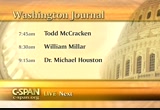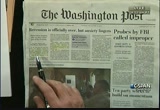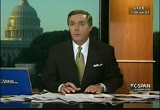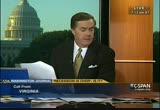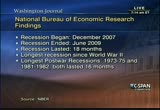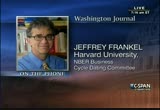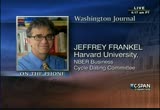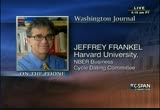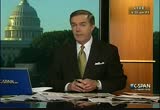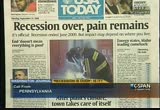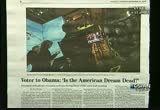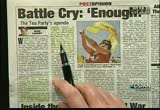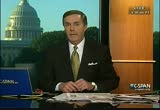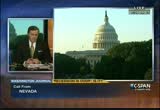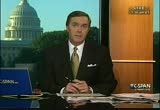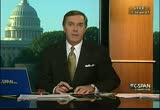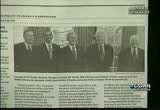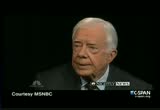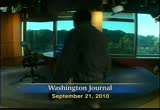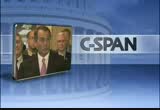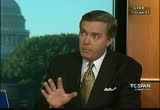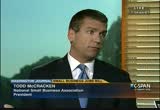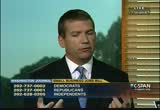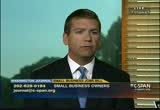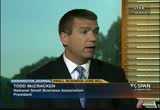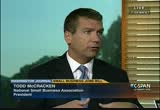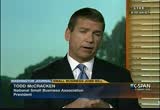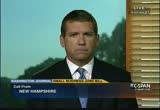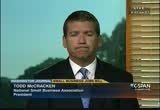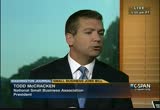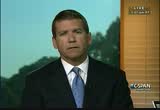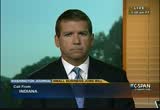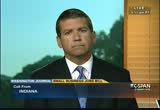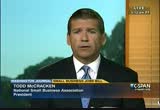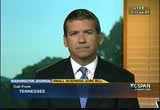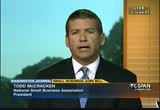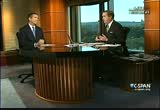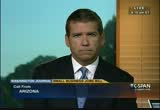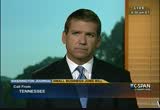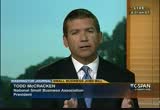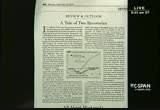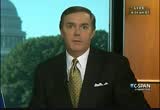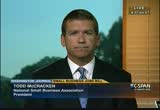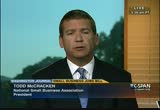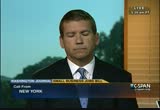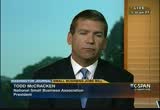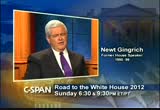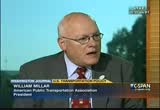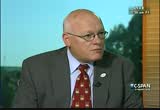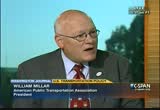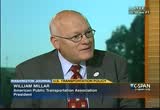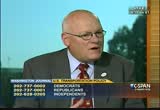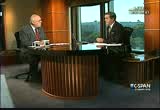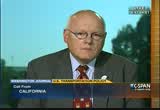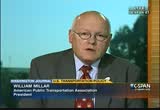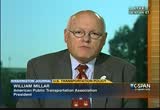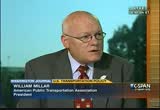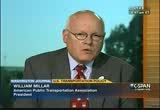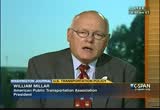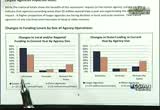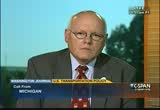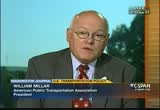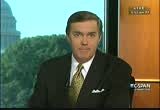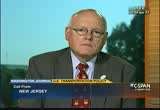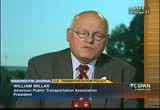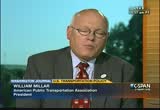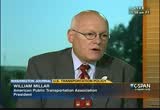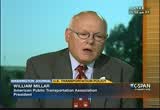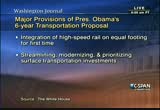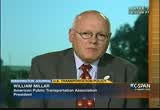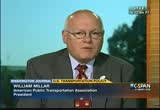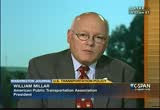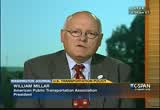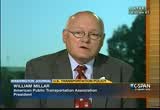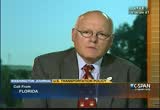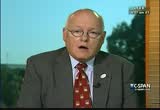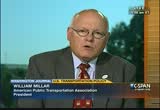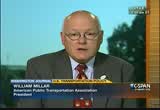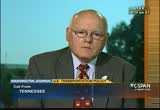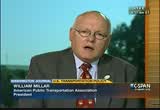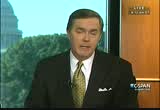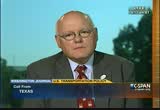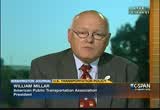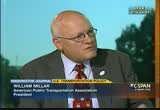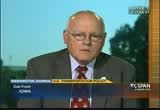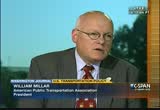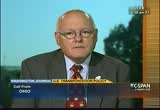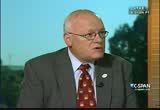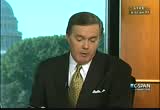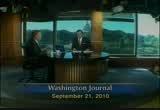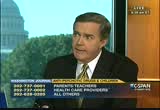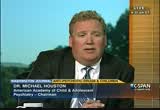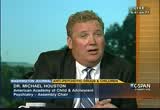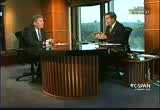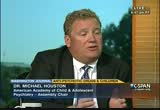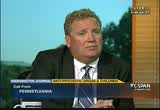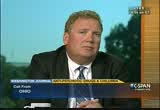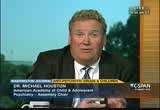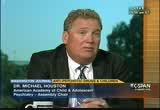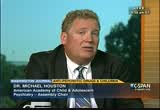tv Washington Journal CSPAN September 21, 2010 7:00am-10:00am EDT
7:00 am
at 8:35 we will discuss public transportation with the president of the american public transportation association. we will be joined by the chairman of the american academy of child and adolescent psychology. washington journal is next. [captioning performed by national captioning institute] [captions copyright national cable satellite corp. 2010] >> i'm the chief financial officer for veterans association. i'm wife and mother and i'm one of your middle-class americans. i'm exhausted of defending new, --defending you ander the mentalist change i have voted for and deeply disappointed with barely are. i voted for a man who city will change things in a meaningful way for the middle class. on one of those people and i'm waiting. i don't feel it yet.
7:01 am
i have two children in private schools. the financial business and has taken an enormous toll on my family. my husband and i have thought for years we were well beyond this. it is starting to knock on our door. frankly,, mr. president, is this my new reality? >> she lives in suburban washington in maryland's with her husband and two teenage daughters. velma is her name. the president back at a white house today after attending a fund-raiser for congressman joe sestak. the house is back tomorrow. the senate returns this morning with a procedural vote on the extension of the defense authorization act that includes "don't ask, don't tell".
7:02 am
the transportation department told a daylong summit on distracted driving. in new york the iranian president speaks before the united nations. today will address the issue of poverty in third world countries, part of the u.n. millennial challenge. we begin with a comment from the economists saying the recession is over. is it? join the conversation. the numbers at the bottom of your screen. and you can join on-line on c- span. other headlines, "the wall street journal", is over, but the pain persists. on the day the recession was officially declared to be part
7:03 am
of history, president obama confronted deepening annexed from business leaders and ordinary americans bristled that the recovery is real. and another one that says the recovery has not been felt. the nation's official reports of the recession is over. but there are still aftershocks in people's lives from the recession. more from mr. de from the president. >> even though economists may say pthe recession ended last year, for the people still out of work and people who have seen home values decline, to pay the bills, it is still very real for them. i think we have to go back to what was happening when i was
7:04 am
first to small and even as the 44 it president, if we went through the worst recession since the great depression. nothing has come closer. if you look at the consequences of the recession in the 1980's and 1990's and the recession of 2001, all three of those, it still was not as bad as this one that we went through. the month i was sworn in, we lost 750,000 jobs. a month after that, 600,000 jobs. and more after that. this was before any of our plans had a chance to take affect. host: warmer to where is the change? the recession is over if you live in law land, says of you're on our twittergate. pat is joining us on the republican line from maryland. caller: i did not understand the
7:05 am
agency that the recession was over. host: it is a group of economists. they said the recession ended in june of 2009. caller: obviously, they are not traveling around the country. if you will take a look at what is happening -- i go to hoses every day of people. in an insurance agent. i speak with people lost their jobs and their wives have lost their jobs as well. their children are dropping out of school. making $9 an hour to support their families. mr. obama is way off when it comes to understanding what's going on in the country. what is going on is more jobs are being lost. we just lost 12 of hundred more jobs at the steel plant in this city. 700 more jobs at the company
7:06 am
that brings the food in for the two stadiums in baltimore city. another company just went bust. that was 1500 jobs. this is every single week for a new place is closing. you cannot tell me there is the recession over. the recession is going to last. i think it's gone to last another two years or three years. >host: now this headline, the recession is over, but the pain lingers. statistics say the great recession is officially over according to the panel of economists. the u.s. is still dealing with unemployment rates of 9.6%. 10% in georgia. weaker home values and the worst foreclosure market in decades. sheila is joining us from carrollton, georgia. caller: good morning.
7:07 am
that lady that was at the town hall yesterday, i resisted calling this morning, but she is right. i am more and alex. mentally worn out trying to defend the president. it hurts me deeply. the recession, whoever the people are the say the recession is over, they are crazy. they are living in a high of the the world's and don't realize what's going on down you said the same thing that she said yesterday her in the forum, you are more out. what is making your tired, frustrated? caller: i live in a very
7:08 am
republican area. all through the campaign, the presidential campaign, i quit a bumper sticker on my car -- i put a bumper sticker on my car and listen to a lot of people, especially from my church, you need to get a new car because of that bumper sticker. i defended him. it is like, i defended the healthcare bill. it is not helping me. 2014 will be way too late for a lot of us. i think it is a waste of
7:09 am
7:10 am
in sterling, virginia. republicans outlining a 20-point plan, if elected, how they would coburn. the front page of "the hartford current." unemployment is about 9.6% in the plaza, it is up 14%. mary is joining us on the republican line. caller: about that whole thing yesterday, it is just spin to make us all but the recession is over. i have been unemployed since may 2008. i remember when obama was elected. he said he would be ready on day one to lead the country and jobs would be his focus. he keeps going back to that
7:11 am
750,000 people that he said he would be ready. he has been in office for almost two years. there are so many things that he can do. i was offered a full-time, permanent job in may of 2008. i could not get it because i am in foreclosure and i had bad credit. they offered me the job, and then they ran my credit report. it would be easy for the lawmakers to change that law. i have repeatedly asked them but nothing is being done. 1 million people unemployed right now. our governor is running for the senate, thinking he is doing a good job, but i have to tell you, charlie crist, 1 million people.
7:12 am
7:13 am
it is astonishing, americans do not have the ability to make sense out of most things. whatever we are going through today began four years ago. low interest rates formed the housing bubble. you cannot expect barack obama to wave a magic wand and turn a recession over immediately into prosperity. you just heard the president said in economics, when you invest a dollar today, you do not reap the rewards of that dollar. it comes tomorrow, next year, or
7:14 am
two years after. >> mike freeman has this point of view. employment numbers are the best measure of main street. jeffrey is on the board at harvard university and a look at the u.s. economy, whether the recession is over. he is a member of the national bureau of economic research. explain the measurement and duration about the recession. but did you take into account? guest: before that, i want to clarify the definition of a recession. saying that we are in recovery is not the same thing as saying that we are good.
7:15 am
we grew fairly strongly in the second half of 2009, 2010 is still growing. we also have to look at a variety of other indicators. part of our job is not only picking the quarter that the recession ended, but the month. monthly indicators include a lot of things, like industrial production, some market indicators. there are two reasons why people feel the recession is not over. things are still pretty bad even though they are better than a year ago. the labor market has also lagged behind. this is the usual case.
7:16 am
in some sense, the turnaround in the labor market is not sliding behind quite as much as it did in the previous two recessions. host: what qualifies as a depression, as we saw in the 1930's? kaska -- guest: there is no depression. depression, most people would say, when economic activity is very low for a prolonged amounts of time. are1930's and the 1890's both considered depressions. i have to say, despite the 9.6% of people unemployed, the great depression was about five times
7:17 am
worse. this was the worst recession since the great depression, but not as bad. host: what is the national bureau of economic research, how often do you meet, what criteria do you look at to assess the economy? guest: the national bureau of economic research is a nonprofit research organization. it includes many academic economists spread across the country. most of what we spend our time doing is academic research but we do other things as well. from the beginning, this core function has been -- well, it is sort of official now -- officially declaring when we
7:18 am
reached a peak and a trough, the end of the recession. that is all, when it started, when it ended. there are eight members that are appointed by the president of the nber . . we look at gdp, national income, personal income, sales, total hours worked in the economy. that is my own favorite measure. host: we are speaking with jeffrey frankel, an economics professor at harvard university. by all indications, the seasonal holiday will result in minimal
7:19 am
temporary job increases. we still have a national rate at 9.6%, certainly higher in states like michigan and nevada. what will it take for small businesses to start to hire again? guest: there want to save the economy growing strongly. in each of the past business cycles, in after things had begun to turn around, they are slow to start hiring again. they want to make sure the recovery is well established. it took almost two years for the employment situation to turn around the last recession.
7:20 am
speaking as an individual, you cannot expect the president to have a magic wand. there is only so much a president can do, even some much that a government can do. in addition, the president can only propose legislation. if congress is determined to block what he wants to get passed, there is nothing he can do. host: jeffrey frankel, thank you for what you and for your comments. the front page of "usa today" looking at how the stock market often reflects --
7:21 am
economist subsidy that the recession is over, but is it? ron on the democrats the hon. caller: i have been a long time your of c-span since the 1980's. i am disabled military at the time. a lot of my father was taken by the collar in virginia -- caller in virginia and that last person you had on. this is the first african- american president that walks into the biggest mass since the great depression. it is not possible for him to get everyone back their jobs. i understand that everyone is hurting.
7:22 am
we just have to understand that the policies he is trying to put in place are for the long run, trying to create more jobs for more people in this country. but until we get through this process -- yes, the recession is technically over with, but for those people with no job and cannot pay their bills, it is not over for them. host: on personal income, where it has increased, decreased the most across the nation. a minimal increase in states like new jersey, maryland, washington, d.c. it has declined in states like rhode island, conn, and nevada.
7:23 am
william is joining us from maryland. caller: listening to yesterday's conversation with president it is no wonder why more and more americans are more cynical. we had a president that came in almost two years ago with a super majority who said his number-one priority was jobs and the economy. he could have gotten great things done because of their great will he enjoyed. he completely left the economy and focused on things that americans again and again said do not go there. now before the election he is talking the economy and jobs again. host: this headline on "politico" --
7:24 am
the nrsc is the campaign committee for the republican party. the president has described it as the summer of recovery. this at making the rounds now from the republican party. >> this was supposed to be the summer of recovery, do i had it wrong? >> secretary governor had an op- ed, welcome to the recovery. >> another setback for the obama administration this summer, a recovery. >> there is talk of a real double dip recession. >> the summer of recovery does not seem to be one of the
7:25 am
seasons for the country. >> stop playing miniature golf, stop putting all that garbage on tv. start creating jobs. >> it is hard to sell this as part of a recovery. >> really, it's a terrific summer. >> 6 in 10 americans say that they are not confident he has the right economic policies. >> congressional democrats facing what looks like big-time change, come november. host: that is from the national republican senate campaign
7:26 am
7:27 am
call. i wanted to comment on the last three callers. i am glad that your guest gave such a good definition of what a recession is. although i take umbrage about what stands at about americans being stupid, i agree, but i would not use the word stupid. americans are so fickle. we expect things to happen overnight. the only reason we were able to recover from the great depression, those americans were able to hunker down and do what they need to do. these days, we want instead gratitude, and it does not work that way. host: in "the new york post" --
7:28 am
7:29 am
george is with us on the democrat's line. las vegas. caller: good morning, america. if eisenhower would have yielded to the people, we would not have the highway system we do today. we take it for granted, but there was a lot of resistance spending that money. he was an visionary. i could argue that we have the internet today because of the highway system. what president obama is trying to do is change structural things in the economy, in society. this is heavy lifting, hard work. i understand, i am hurting like
7:30 am
everyone else. but if we are going to get to where we need to be, not tomorrow, not in the next election cycle, then somebody is going to have to make more choices. maybe we need to take a deep breath and look at future generations, not just us. how is what we're doing going to affect our children? i know people are talking about the deficit and spending, but unless we have some structural changes, we are going to be in trouble. host: another comment on twitter -- inside "usa today" looking
7:31 am
inside the bush era tax cuts, the president saying the tax cuts would be in place for those earning more than $250,000 a year. here is what the tax increase would look like if you earn between $500,000 and $1 million a year. you can see the full charge and impact from those making from $10,000 to $1 million in "usa today." scott, you are next. caller: i wanted to comment, nothing has been mentioned -- we have a bunch of the international bankers controlling our economy. as long as that is the case, we
7:32 am
are at their mercy. congressman roll call -- ron paul has brought up the idea of complete the auditing that the fed. bernie sanders in vermont tried to water it down horribly to the point where it was meaningless. we need to absolutely see what the people are doing with our money, how they are stealing it through inflation. host: thank you for the call. on our twitter page -- by the way, we will take a look at infrastructure later on as we look at the $50 billion proposal
7:33 am
being put forward by the president for infrastructure repair. this morning in "the washington times." the recession the president addressing this issue. the political atmosphere and the bush era tax cuts, yesterday on cnbc. >> right now they are taxed at 39%. what we have said is, let's take them up to 20%. that would be a reasonable position that would still be pro-business but would not be so draining on the treasury. so we have a bunch of decisions that have to be made. i think we can have a reasonable
7:34 am
argument, and there will be differences on how to go about it. some will want cuts, some will want higher revenues, but there are facts and a reality there that go beyond the political rhetoric, and we will not be able to solve this by yelling at each other. host: the entire event is available on the cnbc website. a viewer in new jersey says -- mary says -- to join us online, we will read your tweets.
7:35 am
journal@c-span.org, twitter.com/cspanwj. rita, good morning. caller: i watched president obama yesterday. it is unbelievable what babies we are. what do we expect? we spent all this money for eight years, i borrowed it from china, gave -- borrowed it from china, gave tax breaks to everyone, then we send it to countries, like china. come on, wake up, people. host: inside ""the washington post", an event -- inside ""the
7:36 am
washington post," -- if you want to watch the speech, it is available online at c- span.org. laura -- nora from michigan. what is your of unemployment rate right now? caller: about 9%. how about statewide? caller: about 9.5%. host: is the recession over? caller: i feel like the recession has been over. what people portrayed, many lost their jobs, which is true, but
7:37 am
people are still buying, people are built -- still doing things as usual. i have actually not seen anyone complaining. host: tyler is saying -- this morning, michael gerson, a former pri -- speech writer to president bush. he concludes by saying -- michael person writes about the governor's race in ohio. next is a viewer from westerly, rhode island. good morning. caller: top of the morning. i would like to just pass along a few ideas, if i could,
7:38 am
regarding the recession. quite frankly, i do not think there is a need for a recession. it has been brought about by some very conniving people that really want to impoverish the united states citizens. just looking back on history, the founding fathers gave us a splendid form of government. it was called a constitutional form of government. what we have now is a far cry from it. it is like a communist super bureaucracy. if you looked at the communist manifesto, you would find every one of the planks have been
7:39 am
integrated into american law and government. host: thank you for the call. a correction on something i said earlier. from one of our twitter regulars -- next phone call. caller: i am calling because i am confused. how can people expect anything when they expect the president, and the president alone, to go to each state and set up jobs? what do the governors do, the mayor's? it is their responsibility to
7:40 am
7:41 am
care, and other issues this thursday in sterling, virginia as the republican party outlined its plan, calling it the contract for america. with me now is a reporter for " the hill" two amendments. don't ask, don't tell, and the dream amendment. what is in the dream act? >> the vote today is basically a procedural vote to have the scent moving to the authorization bill. in terms of the amendment, the dream act would be the first one to be debated. but it would allow -- the general gist of the legislation
7:42 am
would be to give a pathway of citizenship to illegal immigrants. host: why is this included in the defense reauthorization act? many say that it is irrelevant to pentagon spending. >>, that is their contention. the defense bill is seen as a must-pass bill. it has implications for the pentagon, pay raises for the military. it is seen as a bill that has to pass. it has passed the last 40 consecutive years. republicans will say that it does not belong on the bill. democrats will say that it is in the right of the senators to offer such an amendment and it
7:43 am
has importance on the defense bill, in the sense that people can join the military, find a pathway to citizenship. so there is a tangential aspect of their. host: quite an exchange between john mccain of arizona and senator lindsey graham on the issue of don't ask don't tell and the threat of a filibuster. could they do so? >> it is up in the air. it will be a crucial time for supporters of the repeal, those who are against it. you need 60 votes to overcome a filibuster. on either side, you need 60 votes. carl levin yesterday afternoon did not know if the 60 votes
7:44 am
were there. you need a couple republicans -- susan collins voted in favor of repeal but there were concerns that debate on the bill would be limited, so that could take away her critical vote to reach 60. scott brown voted in favor of the defense bill out of committee, not for repeal. he would be another one to look at, in terms of whether he would go to overcome a filibuster. of course, olympia snowe as well. host: that may ask you about two other senators. jim webb of virginia, jim blagojevich of ohio -- voinovich of ohio.
7:45 am
>> voinovich will be important, in terms of whether he can give the democrats in the 60 votes that are needed. he does not agree with repealing don't ask don't tell. he wants to let the pentagon do their own study, reform before any legislation is enacted. so far, he has been the democrat to vote against the repeal. host: it is $75.5 billion. if there is the potential for a filibuster, what happens to the pentagon budget? >> it is usually not signed into law on october 1 when the fiscal year starts, but first, congress
7:46 am
would have to approve continuing authority and a continuing resolution to fund the pentagon. senator levin left it up in the air and said it would be a serious setback in the defense bill if they did not have the 60 votes, which means he did not know and did not want to predict what will happen in a lame duck section -- session. it will be interesting. it could be a year where the defense bill does not pass this congress and will have to move to the next congress, and if there is a new congress, they would have to deliberate all over again. a lot of people are saying, even if they would have to mark up the bill, they would keep all of us backs in the bill. of course, if republicans are in power, they would take away a
7:47 am
couple of items that they do not like. host: give our audience a guide -- this afternoon, we will have coverage of the senate floor. what will you be looking for? >> we will see if the democrats have the 60 votes to overcome the republican filibuster and look at how senator collins, senators know, scott brown, are going to vote on this. also, keeping our eyes peeled for democrats who will be voting against moving for the defense bill. senator webb and other democrats, but he is the main one that we are looking at right now. host: thank you for being with us.
7:48 am
we are going to turn our attention to the economy and the role of small businesses. we want to bring to your attention two former presidents making news. a photograph of former president bill clinton in haiti. and from ""the washington post" there is a photograph getting some attention. this was taken when president- elect barack obama visited the white house for the first time george bush, his father, bill clinton, and off to the side, jimmy carter. brian williams sat down with jimmy carter and said, the last
7:49 am
time that you were photographed, you were off to the right. i thought to myself, there is a possible metaphor. here is his answer. >> i feel my role as a former president is superior to others. primarily because of the activism and injection of working into international affairs, serve the domestic affairs, energy conservation on the environment, things of that kind. we are right in the midst of a constant debate. under my leadership, when the united states could not deal with troubled areas, we need with leaders to bring an end to a conflict, a human rights abuse. i feel we have an advantage over former presidents in being involved in daily affairs that
7:50 am
shape policy. host: for president jimmy carter on nbc news. this is a photograph receiving some attention. also getting some attention on "60 minutes" where he blamed the then-senator kennedy for killing his health care bill. one of the biographers for former president carter will be sitting down with him on "after words." jimmy carter coming out with his 25th book. c-span.org for scheduling information. we focused on the recession, how about small business and the economic agenda? we are back in a moment.
7:51 am
>> the c-span video library is a great resource to see it is happening. the c-span video library, watch what you want, when you want. >> i underestimated how big the job was. i'd jump from minority whip to speaker overnight, and from a minority party that no one thought would be in power to leading a wave of 9 million additional votes in 1994. >> newt gingrich on his tenure as the house speaker, and a possible 2012 presidential bid. sunday on c-span. >> we provide coverage of
7:52 am
politics, nonfiction books, and american history. it is all available to you on television, on-line, and social networking websites. and we take c-span on the road with our digital bus, bringing resources to your community. c-span, now available in more than 1 million homes. >> every weekend on c-span 3, american history tv. 48 hours of people and events telling the american story. historic speeches by national leaders, eyewitness accounts of events that shaped our nation. top history professors and leading historians delve into america's past.
7:53 am
host: the economy and small businesses is the topic as the -- we have the president of the the national small business association. guest: the president who was pointing out some things, people do not feel like the recession is over. host: he will also lead the recovery. you believe that he is doing so? guest: every last generation of small business has led us out of it. that is not yet happening. that is why we are hopeful of the jobs bill the house has taken up this week. small businesses really do lead us out of recession. host: the president spending
7:54 am
august criticizing republicans for blocking the small business bill. what is in the legislation, but will it mean for small businesses, it is it -- is it enough? guest: it does a lot of things. one of the important things is it gives incentives to small communities to lend more. they get cheaper money to lend, if they lend more, which we believe is the right incentives. it also has some programs that the spla has had under -- sba has had under its program for awhile. unfortunately, that program expired in may and has not been reauthorize. this puts money back into the program again, which had been really productive. in addition to lending, there
7:55 am
are a whole bunch of tax breaks for companies. expensing allows them to immediately deduct their capital purchases, other equipment needs in the first year, increases the ceiling for those things. this year, it reduced health care costs in real terms for the self-employed. it allowed them to deduct their health insurance costs from their self employment taxes. they are the only people that does not have their pretax coverage text. host: to find a small business. guest: we do it arbitrarily by about 500 and employees or
7:56 am
smaller. but there are lots of small businesses that are viable. host: i ask you that because we have one mind set aside for small business owners. we really want to hear from you, when you're dealing with, in terms of taxes, hiring, and sales in your area. if you are a small business owner, 202-628-0184. dennis has this comment. when you hear that, what do you say? caller: i think that -- guest: i think that is a mystery of the
7:57 am
economy. the small business community makes our economy so vibrant. if you look at innovations, the numbers of patents filed, small businesses and stripped of large employers. if we do not have these innovative start-ups in the economy, we could rapidly fall into a backlog position. host: another viewer writes -- guest: people should be aware that the health reform bill does not impose new taxes unless they have more than 50 employees. but certainly, the employees will be required to have health coverage, and that will definitely hit those people. host: is that a good thing? guest: for a long time, we
7:58 am
thought everybody should have health insurance on an individual basis. in the near term, those requirements will be a significant burden on small business hiring. host: if i have a small business, i am moderately successful, the bill passes and is signed into law, how can i get some of that money, loans? guest: this is not a government program to lend to small businesses. what will happen is, more community banks, primarily the one such small businesses borrow from, will have cheaper access to capital. we would encourage these businesses to work through their community bank, the bank that they have been working with all along. that is what we think is missing in this economy. why small business is not
7:59 am
growing us out of this. even when they see opportunities, they do not necessarily have credit available to them to take advantage. host: we had a caller earlier from upstate new york indicating -- actually, he was from baltimore. he was talking about the number of plants that have shut down or scale back. if you have a large or moderately large company that closes, what impact does that have have on the diners and coffee shops and the mom and pop hardware stores and the other small operations that depend on other people being employed? guest: a huge impact, obviously. which is why i think it is important to understand the dynamism of the american economy. the small business community, the reason why it is so important to growth is small businesses and other businesses are constantly going out of business and downsizing and we have to have a constant pipe
8:00 am
line of new companies coming in and hiring employees to replace them. that is one of the things really missing in the economy. credit is so crucial. which is why it is such a high agenda item. when that happens, there has to be an ability for other companies -- taking advantage of new opportunities to replace those lost economic activities that happen every day. host: the president was addressing this yesterday on the cnbc forum. but first we want to hear from clinton, maryland. democrats line. caller: how low? -- hello? my question is this. but if a small business during these economic times, if they start to default on the loans would not affect the way the receive credit? guest: certainly. if businesses are not paying
8:01 am
their creditors off on time? absolutely. small businesses, like individuals, are heavily dependent on credit stores -- scores. so if they fall behind, and it affects their credit scores, they have a hard time getting other lending. host: mark is joining us outside of washington, d.c. silver spring, maryland. what is your business? caller: medical. host: how many people you employ? caller: currently we have two but we will increase to 7. host: how is business? caller: it is going pretty good. very, very well. one thing we may take advantage of is the capital investment package. we have to get a chance to write off equipment. probably will expand into virginia and some areas of d.c. host: de have a question for
8:02 am
todd mccracken? caller: no, i am just so thankful for the small business plan. i think it will definitely stimulate the economy. i know there was a recession, and now we are out. so we are just looking to increase our productivity now and continue to hire. host: thank you for the call. mark also joining us from northfield, new hampshire. republican minority caller: good morning, gentleman. thank you for taking my call. when george bush came into presidency in 2001, from 2001 until 2006 with katrina, with inheriting the attacks on our country, he had 52 months of job growth with his tax cuts. i want to know, todd, what specifically besides giving federal money to the banks to lend, what specific policy has
8:03 am
barack obama put in place to help small businesses grow? thank you so much. guest: the lending has been a part of it. although, in all candor, many of the provisions in this bill that we think will pass the house later this week and be available for his signature should have been done a year and a half or more ago, we think. so it is, we think, very positive, but a lot later in the scheme of things than it should have been. but nevertheless, earlier on in his administration -- many of the tax pieces, such as expensing that the previous caller mentioned, were put into place initially in the earlier stimulus bill and the now being extended and expanded upon. but other tax rates have also been reduced -- reducing capital gains of small companies.
8:04 am
host: the longest recession since the 1930's, officially by the board economist, the headline from "the wall street journal." the slump is over, the pain persists. the president traveling to the newseum, speaking to small business owners and other individuals and 01-hour for, sponsored by cnbc, carried live. he was asked by a small business owner about the state of the economy. >> i think that american businesses like yours are what makes this country go. we have passed eight tax cuts for small businesses so far. we have made it easier to you to invest in plants and equipment. we have already taken down the capital gains and want to reduce its down to zero for small businesses. all of these things are what historically been considered pro-business agenda is. host: todd mccracken, are they
8:05 am
pro-business? guest: those particular policies. but we think a lot more can be done. if they really want to help small businesses grow. the one idea bandied about is a payroll tax holiday. we were in favor of that in the original stimulus bill at the beginning of the obama administration bared probably would have been in a lot better shape if we had been. i think he could have much more credibly stake a claim too great pro-business agenda if he had. host: the bush administration, giving back anywhere from $300 to $500 and a tax rebate but by all accounts it had very little impact. guest: it is hard to know. it certainly did not spark a period of economic growth, as far as we can tell, but that is what is so hard that looking back at any time a period like this, trying to figure out what this something did not help or if something -- if that had not
8:06 am
happened in the first place. surely a rebate had some small effect. but it clearly did not bring us out of the recession. host: let me read from "the wall street journal." from its editorial. "a tale of two recoveries." we have been talking about the recession. the great recession and it 15 months ago, in june of 2009, the word from the economists from the national bureau of economic research, which tracks the youth of this business cycle based on a variety of economic variables. then this conclusion --
8:07 am
can you elaborate? guest: i think there's something to that. i do think that the sense that business owners have, especially small business owners, about what is around the corner. our taxes going up? if they are more successful will they be taxed on that, i think is a real dynamic. and i think the fear out there, whether it will actually be borne out or not, is a question. but the fact that it exists in people's mind i think keeps them back from being at full throttle and taking opportunities. host: our guest is todd mccracken, president of the small business -- association. texas. what is your business? caller: good morning. we breed horses.
8:08 am
i have four people who are employed. one of them is another family member. i don't know what is going to happen to us. our business on our farm, it has been in our family for 25 years. it belonged to my mother and my father. one of them is already gone and the other one is probably not going to be around for another year or two. the farm has been appraised at -- i think it was $450,000. and this is going to be true of many neighbors that have farms, whether they are in the horse business or some other business. i think we are going to all lose our benefits when the death tax break expire spirited that has a
8:09 am
lot of us concerned. that is probably true of many of my neighbors. host: it kicks in next year, correct? it takes effect next year? caller: correct. will expire. there is just no way around -- is that death tax, which is the most unfair tax, i believe, that is on the books. host: what is the pay will for your four employees? guest: i think the payroll -- caller: i think the payroll, probably $40,000 is what i make. the other family member makes the same and the two hands that we have working, they probably
8:10 am
make $32,000 a year. host: how long have you been in business? caller: we have been in business here for, i guess a little over 18 years. host: jim calling from all grits, texas. appreciate your call. what do you tell them? guest: the farm is appraised at $450,000. even though the current emanation of the death attack goes away at the end of this year, it reverts back to the old levels back to 2001. which did have an exemption of a million dollars in assets. so it might not in fact affect this particular farm. nevertheless, we think it is grossly irresponsible -- even at that level there are very middle-class families supported by businesses worth in excess of a million dollars and will be hit very hard by increase in the estate tax. host: your response on the
8:11 am
payroll tax holiday on twitter. guest: that is true. of course, this done in context with the largest in the the spill in which the government was fargo -- foregoing a lot of revenue anyway. it probably would have been a better way to do it, because it not only gets money in the pockets of essentially lower- paid workers who would spend all of the make but also in the pockets of the businesses to hire them and greater incentives not to lay people off and greater incentives to hire people. it would have been a better use of the same money. host: indiana. independent line. caller: i guess my question is, how can small businesses help expand the middle class?
8:12 am
generally small businesses may not pay as much as a larger firm. i just see so much unemployment today. i just wonder how -- can we create a nation of small businesses that actually help the middle class in this country? host: what are you seeing in your part of indiana? caller: there are a lot of industrial companies. you do see some unemployment here. but really looking historically, it is the larger companies that have expanded the middle-class. guest: actually, i am not sure that is true. you have to think about the huge diversity of the small business community. i think some people think that when they think of a small business they think of a small retail shops that may only have part-time workers or relatively low-paid workers. in reality, if there are small businesses, and every facet of the economy. employing ph.d. scientists.
8:13 am
growing rapidly. architecture firms. physicians. cpa firms. a lot of professionals in small businesses. also all kinds of small manufacturing businesses. construction firms. it's really is, i think, a pathway to truly be the american dream for millions of americans. host: responding to our viewer in hammond, indiana. saying things to mitch daniels. in the black. mitch daniels talked-about as a possible 2012 republican candidate. jd from murfreesboro, tennessee with todd mccracken. good morning. caller: good morning. host: go ahead with your question. caller: i really don't have a question. i am relieved to hear the recession ended in june of 2009. i am simply wondering why we spent over $1 trillion to
8:14 am
prevent recession. since the recession ended over a year ago. i own a small business. and as i on a research firm and i can tell you personally that evictions are up, people being served with warrants are up. i don't think the recession is over. small businesses will continue suffering for the foreseeable future because there is no relief. anyone making over $250,000 a year, by the way, come january, will pay through the nose. i would like your guest to address this. guest: we have asked the obama administration to extend the lease currently in the tax rates.
8:15 am
we do not think it is the time to increase anyone's tax rates. there are small businesses are taxed at the individual rates. the ones that have those higher levels of incomes are the ones that are more successful, with a much more likely to be in a position to grow and hire workers and we think this would be the wrong time to disincent them from doing this. this debate about recession is semantic. technical definition, which is two quarters in a row of a shrinking economy. we have kind of stopped shrinking 15 months ago but that does not mean we have been growing in a meaningful way. host: this morning in "the washington post" writing about the bush tax cuts. and the alternative minimum tax. what is that? why was it put in place in the
8:16 am
1970's and why do we still have it today? guest: it was put into place initially to capture people who had a lot of tax loopholes, wealthy people. so, to ensure that everyone paid at least some minimum level of taxes, alternative minimum tax on their tax burden. you have to remember, back in the 1970's, we have very high marginal tax rates but also extraordinarily generous loopholes and deductions, so it was really easy to essentials hide your income -- essentially hide your income. this was to get around this to make sure the wealthiest americans paid at least some share. over the years paid at least what happens is the levels had encroached on the middle-class and it has become very difficult to get rid of the amt
8:17 am
so every year they have done a temporary patch which essentially hold harmless a block from pay it for another year. but it depends on the actual income of the individual. hits a lot of folks. host: if you are a small business owner and you bring in a quarter million dollars a year or more, would you pay more in taxes if the bush tax cuts go away? or is it on income? in other words, if you have a small business and you bring in revenue access of a quarter million dollars a year, would you pay more in taxes because the bush era tax cut, if they go away next year, or is it based solely on income? is the revenue or income that becomes the criteria? guest: it is income. for instance, -- and, you make,
8:18 am
not the revenue derived from it. after the various deductions. host: good morning. democrats line. caller: my question actually relates to this and it shows my ignorance because i always worked as a wage owner -- turner. i heard the argument of the obama plan was that many small business owners take the profits of their business and pay as a personal income-tax rather than under some business tax plan. i was always under the impression that businesses pay a lower tax rates, like capital gains is a lower tax. i don't understand why a small business owner would take the profits from the business as personal income tax. i don't know if there is a simple way to explain it. also wondering if there are problems in our patent system
8:19 am
can bring small business and growth and development of small businesses? >> thank you. appreciate the call. guest: first off, on your question of income, yes, most small business owners operate where basically all of the income passes through to them as an individual. so, they are taxed at the individual level. companies that are incorporated pay taxes at the corporate level, they pay corporate rates. but for the vast majority of small businesses, it makes more sense for them to organize themselves as a pass through. much simpler way to organize yourself, organize your company. and your tax rates will end up being exactly the same as someone who is a teacher or dentist or wherever they happen to do. plus, they play this -- pay the so-called self the employment tax. both have some of the fica tax
8:20 am
that other workers face. let's go to john from newport, tennessee. what is your small business? caller: it was a music store -- taught lessons and stuff like that. host: how's business? caller: i sold it. it took a $65,000 loss. i tried to get a loan and i could not. thank god i couldn't, because i could not have paid it back. small business needs customers. there and of customers that have any money. i remember when there was a debate with george h. bush and bill clinton and ross perot talk about nafta and they said it is ok because we have -- or an
8:21 am
agricultural country, going to it industrial and now high-tech country. where are all the high-tech jobs? with the 25 million baht out of work. i saw the news out of -- the other day. opening soup kitchens in detroit and chicago. pretty soon we will be a third world country and then our government that had to the hills. guest: in your case, the economy may have gotten to the point that the loan would not have enabled you to survive. i am really sorry for that. but we think lending can help some other companies. and that, in turn, we think will help other companies get the demands that they need because you are exactly right, there is a huge demand gap. businesses need customers. but the reality is if there are businesses that have the opportunities. but they've got to have the
8:22 am
credit to bridge the gap to take advantage of the opportunities. they need to hire employees, by employing -- equipment, lease office space. those employees, vendors, landlords, are not falling to wait to get paid until they can exploit the opportunity. they have to fill that gap with credit from the bank. if they can do that, then the new employees will have in turn in come -- income. this is one way to get the customers to them. it is a bit of a chicken and egg problem but we do think there are real opportunities that could be exploited by greater credit availability. host: let me follow-up when he said people are not spending money. clearly if you are out of work, you will not spend money. but if you have a job, are worried about your job, worry about and lay off, you will not spend money. if your home is worth more -- if
8:23 am
your mortgage is worth more than your home's value, you will not spend money. if he lost investment, you will not pull back -- you will pull back spending. for the people who have jobs and don't want to spend, what will get them to spend more money? guest: it comes back to confidence in the economy. if the house price starts going up again, will begin to spend some more money. but one of the biggest single factor years i think is the sense that we are growing again and they don't have to be quite as wary about -- worried about losing their jobs or their spouse losing their job as before. host: let me go back to the "wall street journal" editorial.
8:24 am
no but competing explanations for this undeniably disappointing performance of the economy. the fiscal stimulus saved the day and we need more of it. our view is the hyperkinetic government policies have done more harm than good, leading to uncertainty and higher cost that have undermined businesses and consumer confidence and slowed the country's economy is otherwise natural recuperative powers. agree or disagree? guest: on the one hand, stimulus does cause additional spending and economic growth. but all of the attention and worked getting these things in place gets to the point that i was making before, which in some ways hurts people's confidence at some level. then it just adds to people's worries and a sense that no one is really grappling with this problem as we go along.
8:25 am
host: we are talking to todd mccracken, president of the national small business association. maine, on the line for republicans. caller: i just sold my small businesses here in maine. host: what was your business? caller: movie theater. host: why did you sell it? caller: because i am extremely concerned about what the future holds. the economists were screaming at the top of their lungs when we had this housing bubble, that we have the bubble that was going to go bust. they were ignored and laughed at. ridiculed. we now have a new bubble. we transfer the toxic debt to the public sector. with the treasury bubbled. that will go must eventually and it will lead to double-digit inflation. how is my business colleges survivor any small business survive once consumer discretionary spending is tapped out spending all their money on
8:26 am
food, energy, just the basic necessities of life. just a bubble after bubble after bubble, and we have not stopped. the federal reserve is just pumping money into the system and a bubble is going to go burst. it will bust the bentley. host: how long did you own the movie theater? caller: 14 years. host: how many employees? caller: four people. which i loved. i did not sell it lightly. but i do not see how we get out of this without a lot of pain, or a lot more pain than if we do the right thing which is to save money, invest, and produce. we can't just keep borrowing and spending money. 8 so did you have trouble selling the business? caller: the business is doing pretty well. if i base my decision on the way things are going now i would not have sold. i am concerned a year from now
8:27 am
or two years from now. looking to the future. host: we will get a response. guest: i think the situation you described, while on the one hand, you sold your business, but i think the same kind of thinking for people keeping their businesses is one of the factors causing people not to hire and causing people to -- at some level, your point is exactly right, that we cannot go deeper in debt. it just creates a different kind of ball. but the reality is i think a recession we are in right now is in some ways growing out of the bubble we were in because people are to a greater degree saving again. that saving that they are doing is going to help us in the future as we reinvest and
8:28 am
stabilize and grow out of this. host: you do get more information logging onto nsba.b is -- jeff from florida. good morning. caller: i have a question and a concern. the patriot long for veterans. wondering if there is any activity for met -- patriot loan. guest: in terms of? caller: loaning down to us of veterans. host: you need to start businesses? caller: to gain some monetary to help us of parrot guest: as i am sure you know, there are a number of programs through the re sba to help veterans. senator kerry is to be chairman
8:29 am
of the commanding, and was a leader in veterans business issues and did put together that bill. i have to go back and see where things stand with passage right now. but we certainly have been supportive of efforts to get more cash into the hands of both the veterans businesses and all small businesses. host: upstate, new york -- upstate new york, binghamton. caller: i just wanted to say that i am amazed at the ignorance of this administration. you are postulating now that small business loans of up like that, going through the banks, who are not lending and a continue not lending. they have been not lending for the past year and a half or even better, right? the other thing is the fact that he has to pay for the new obama care, and it is frightening
8:30 am
because you don't know what will happen after january. i have seen my health care policies go up 100% or 150% in the meantime. incentives. we have seen over in china where they are making the ipod and the other various technological things, that they have 300,000 people. they get a cheaper rate. there should be a tariff on the products sold into the united states or create an incentive to have the companies to some of the manufacturing back here and create jobs. but there is such a plethora of obstacles that no creativity is fair and balanced anymore. that is all i have to say. thank you. guest: you have a lot of things in there. i think you are right on most of them. the credit stuff, you are right, banks have not been lending. the thing that has been a little encouraging -- banks cannot additional help unless
8:31 am
they increase their lending to small companies. very unlike tarp in that sense, in which they did not increase their lending. the stuff in this new small- business bill, directed a smaller community banks and they did not get anything unless the increase their lending to small companies. host: one of the dichotomies pointed out on the front page of "the washington post, neil whirlwind indicates the crisis may be over, referring to the request and -- recession. the stock market has been up, but the frustration over the slow recovery remains. guest: i think that is a good synopsis of where we are economically. that the financial sector, that the investors seem to be doing better but it has not really translated to main street yet, the small businesses and every day workers. that and turn translates to political difficulties. h., todd mccracken, president of
8:32 am
the national small business association. nsba.biz. please, come back again. from one of our new tweeters. you can join the conversation that twitter.com/c-span-wj. and you can send an e-mail as well. "washington journal" continues in a couple of minutes. we will turn our attention to infrastructure. mass transit, highways. where should the money go and where should be invested? is it a wise investment? first-come a news update. >> elizabeth warren, president obama's choice to run the new consumer protection agency, in
8:33 am
remarks today on cbs's "the early show" said she never really wanted a job. but now that the president has turned to her to organize the new agency, she is ready to take it on. she said she will not back down in the face of business resistance. an update on the war in afghanistan. the taliban claims it shot down a helicopter. a coalition says nine service members were killed in the crash. today's class is the worst for coalition forces in four years. it the chief of interpol in remarks during a conference of world police chiefs in paris says the skyrocketing number of extremist website is making it easier for terrorist to recruit middle-class youth around the world. he says fighting this kind of terrorist recruitment is especially difficult because viewing web sites isn't necessarily criminal. the general added that the number of extremist websites tracked by police was 12 in 1998. it and over 4000 in 2006.
8:34 am
those are some of the latest headlines on c-span radio. >> the c-span video library is a great resource to see what is happening in washington. find the most recent event would cover, the ones most watched and most shared. all free, c-span video library. watch what you want, when you want paired >> i really underestimated how big the job was. because i had been the republican minority whip. i had not even been the minority leader. i jumped from minority whip to speaker overnight and from sort of a minority party that nobody thought was going to be in power to leading a wave, 9 million additional votes in 1994. the biggest one-party increase in an off-year in american history. >> newt gingrich on his tenure as house speaker, state of
8:35 am
politics today, and possible 2012 presidential bid. sunday on c-span. >> "washington journal" continues. host: we want to welcome back william millar, president of american public transportation association. thank you for being with us. guest: glad to be here. cents -- >host: a new proposal the president has talked about enclosed the following. rebuilding 150,000 miles of roads across the country. constructing and maintaining 4,000 miles of rail, enough to go from east to west. and rehabilitate or reconstruct 150 miles of airport runways. how much will all of this cost? guest: we were very pleased about the president's labor day announcement. the legislation for transit construction, and for that matter, aviation, has expired. in the case of roads and transit, it expired a year ago,
8:36 am
and we have been working but the administration, with congress on a new six-year bill. the president didn't announce the total amount of money he was envisioning for its. he did indicate he had hoped the that about $50 billion would be put up front to speed projects along. however, in the house of representatives, chairman of the transportation infrastructure committee had it introduced a bill and his committee that would provide some form budget of the familiar dollars for road and transit construction and an additional $50 billion to improve highspeed interest -- intercity rail. we would have hoped the president's numbers would be very close to what mr. oberstar proposed. host: how does the u.s. compared to great britain, germany, france, japan, when it comes to highways and road construction and high-speed rail?
8:37 am
guest: in this country, going back to the 1920's really, we made a choice to make major investments in our road systems. certainly, we have the world's greatest road network, to be sure. but we let our public transit systems, our inner city passenger rail system, is sent to dwindle and in some cases actually die. beginning about 50 years ago we began to make small reinvestments in those. and over the last 15 to 20 years, we made greater investments. certainly in the obama administration, he has put a great deal of focus on high speed and inner-city rail with initially billion dollars in the recovery program and additional $2.5 billion since then. so we are beginning to make investments. as far as intercity rail, we are far behind the rest of the world. i think many people who travel overseas come home and they say
8:38 am
why can't we have of the high- speed trains in france, or why can't we have the greatest service in japan, and of course, our new competitors, you might say, are investing a great deal. china with many hundreds of billions of dollars investment in their public transit systems and their road systems and inner-city rail systems. and so, we took the president's call for investment in infrastructure as the recognition that the benefits of the investment that you make today come back over the next several decades in terms of economic productivity and just general improvement and life. so we need to certainly catch up with what our competitors are doing. need to expand it when appropriate. we need to build a transit system and expand those. and we need to increase and improve our inner-city rail system here in america.
8:39 am
host: we will take your calls and a moment or you can send us an e-mail or send us a twitter. if you live in washington, d.c., area, take the metro system, under a lot of scrutiny for the aging of the system and it is a relatively new system when you compare it to, say, the new york subway system. what does it need? how is it doing? guest: this morning i took the washington metro, it took me right here on time, everything went well. but the washington metro, like every transit system in america, is getting older every day and we need to reinvest. it is a little like your house. if you buy that house. perhaps it is a new house. everything looks fine. did you do nothing to that house -- year, a little something shows up. that doctor did a little more bent or maybe a part of the roof -- gutter gets a little more
8:40 am
bent. you have to take care of what you have. the difficulty with some washington metro system these days is we forget the first part to open over 30 years ago, which meant they were designed and constructed nearly 40 years ago. and there simply has not been enough investment in maintaining it. this is true around the country. it is not unique here in washington. and one of the things we are very hopeful with the president's proposal is that we will see more investment in what is called the state of good repair. in other words, keeping the existing systems in good shape while we also expand those systems and build systems and parts of the country where they are justified. host: while you are talking about this, there is a discussion of $50 billion in infrastructure. but you also have an increasing debt and deficit. you have a collision course of higher debts and get more
8:41 am
spending. guest: here in washington, we do our budgeting like no one else would do budgeting. we budget the same way for pencils and other consumables that we do for building a transit system that will still be here a hundred years from now. we need to invest in infrastructure. the infrastructure becomes the basis for all of the other economic growth that the country has. and just as our parents, grandparents, the people before them, invested in and the structure that would benefit from today, we need to make investments today that will benefit our children and grandchildren, and so on, down line. host: william millar is president of the public transportation association. we will get to your calls in a moment. in milwaukee on labor day weekend the president discussing this specific proposal. here is part of the address for the union crowd. >> over the next six years we
8:42 am
are going to rebuild 150,000 miles of our roads. that is an officer of the world six times. that is a lot of roads. we will lay and maintain 4,000 miles of our railways. enough to stretch coast to coast. we will restore 150 miles of runway and we will advance the next generation air-traffic control system to reduce travel time and delays for american travelers. this is a plan that will be fully paid for. it will not added to the deficit over time. we will work with congress to see to that. we will set up an infrastructure bank to leverage federal dollars and some of this -- focus on the smartest investment. we will continue our strategy to build a national high-speed rail network to reduce congestion and travel times and reduce harmful emissions. we want to cut waste and
8:43 am
bureaucracy, consolidate and collapse more than 100 different programs that too often duplicate each other. host: william millar, the president in milwaukee. your reaction. guest: we were very pleased with the president's announcement. we have been urging for more than a year for that we need to develop a new transit and wrote authorization program that would cover the investment over the next six years. we were very pleased with the president's announcement. it aids code joining us from the republican line. -- the joining us from the republican line. los angeles. caller: how realistic, william, is a high-speed rail from los granted to las vegas, bu the city's debts around los angeles, we do have interstate 15. how realistic is that idea?
8:44 am
secondly i think and would like to call on the transportation secretary to really take a look at the wasteful spending when it comes to repairs, building new roads. if you look back at "falling down" the film, where they had been working on a freeway for months. i see it all the time. don't you think things are taking a little too long and they are spending a little too much money? thank you. guest: let me comment on both. first is to the details of the las vegas to los angeles or las vegas to anaheim route, i am not familiar with the details. however, what i do know it is one of the most carefully studied routes. it is believed the private sector may actually come in and finance most of not all of the project because they believe the writer should is there --
8:45 am
ridership is there. if there is a corridor where the private sector could make a return, that is the way most people would want to see us go. the issue of how long it takes to build projects, be it roads are other types of projects, major public works projects are very complicated. the real length is in the planning and development. it is not uncommon for over 10 years of planning and -- environmental work, other types of engineering and steady work -- before the first shovel is put in the ground. usually, unless there is an unusual situation, once the actual construction starts, that normally goes fairly quickly. so we would propose in the new legislation that steps be taken to try to speed up that process wherever it can. we want to make sure that there
8:46 am
are proper timetables on reviews of the various aspects of it. we want to make sure that once the project is committed, that the actual design and development and construction goods quickly as it can. host: whether it the new york subway system, the metro, the revenues from farris, a majority of where the income comes from. you put together a grass. pointing out that 47% expected decreases in fare revenue this year. he also point out that five transit agencies are reporting projected budget shortfalls in excess of $100 million. how did you make up the difference? guest: the recession has hit public transit very hard, just as it had so many people and some institutions and companies in our country. earlier this year we did a
8:47 am
survey of our members to determine just how is the recession hitting them. what we found is that as of the early part of this year, some 59% of our members transit systems had already had to institute administrative economies, raise fares, cut service, in some cases, like often please. and many more were planning to do so. so by the end of the year, unless there is proper aid that comes forward, we will see perhaps as many as 84% of the transit systems in the country having to raise their fares, cut service, or take other kinds of actions. transit systems have to balance their budgets. that is a requirement. and they do balance their budgets. sources of revenue include, as you said, the fares that the customers pay. some portion of the costs. but the remainder of the cost comes from a variety of sources.
8:48 am
in the largest -- cities, normally some kind of tax that the voters supported -- voted to support, or county commission approved for public transit. in smaller communities, in addition, state aid in both large and small, and in smaller communities, the federal government also supplies operating assistance. why did governments invest in public transit? they do so because there are many, many benefits to societies in investing in public transit. let me start with over all economic benefit. it is estimated that for the average public transit project, about $4 -- $4 a benefit is return for everyone dollar investment. i think all would agree that is a good investment. for every billion dollars invested in public transportation, approximately 36,000 jobs are either supported or created. at this time, as we struggle to
8:49 am
come out of the recession and we need additional jobs. beyond these things, there are many other benefits. for example, 37 million fewer metric tons of carbon that go into the air every year because americans use public transit. we by 4.2 billion gallons less of foreign oil because americans choose to use public transit. as americans, we are a country that likes choice. some days, some check -- trips, taking the car is exactly the way to go. but a public transit is available, many days, public transit can be the way to go. so there are enormous benefits from a federal, state, and local investments made in public transportation. host: one of the charts from your agency. these are the key things. funding by local or regional agencies, and funding by the state government. you can see the decrease by
8:50 am
local and state government of almost 80% by local governments, almost 70% by state government agencies and less than it -- than 10% seeing an increase when it comes to funding mass transit programs. guest: state and local governments have not been immune to the recession. on this program you have certainly had many speakers in the last year and a half talking about the impact of the recession on revenues. since public transportation is a public service that is often supported by state and local governments, when their revenues fall, unfortunately revenues that they are able to invest in public transit fall as well. so, not a surprise. host: mike is joining us from detroit. democrats line. bill millar. caller: my only issue is i really appreciate if we as a country could stand behind a guy
8:51 am
like this guy talking about public infrastructure. travel around this country and see how third world countries are moving faster and faster than we did. in any way you can look at it. it is a shame it is a shame for this country to sit down and look at developing countries moving faster, faster ahead of us. if the national media concoction trade on our public transportation and infrastructure, it would be a big plus. the other thing i am really concerned about. just like a wife and husband in a house. if both of you cannot work together, how can progress be in the house? we left everything for the president. why did the national media cannot ask republicans to --
8:52 am
ever since this president took power, nobody in the republican side ever decided to say, did know what, for that benefit and betterment, let us work together and forget about our -- and work for the benefit of this country. that is a big plus. why is it the national media not picking -- democrats and republicans saying, we don't care what you decide or wish, you have to sit down and work together and forget about -- host: thank you, mike. guest: certainly i agree with your first point, that we need to be investing in public transportation. the census bureau tells us only a little over half, about 53% of all american households have any formal public transportation. our estimate is only about 20% of households are near what we call a reasonable level of public transit.
8:53 am
that is a bus service or rail service that is frequent enough that they would use it. the second point, traditionally when the congress to consider investment in roads and public transit and other public works that benefit us all, historically that has been one place that regardless of what ever else is going on between the parties, they usually are able to come to an agreement. and the bills for investing in public transit and roads typically passed 350 votes or more, indicating that however messy the process is to get there, by the time the congress votes for it, there is usually pretty good bipartisan agreements. and we are certainly working with both sides of the aisle, with both houses of congress as well as the administration to make sure the investment we need in our infrastructure is allowed to go forward. host: john is joining us from a
8:54 am
harvard -- egg harbor township, new jersey. caller: why is there no interest in monorails? disneyland and disney world have had them for over 60 years. they are fast. convenient. also cost-effective. they don't require purchase of right of way. they can go over highways. the problems in that area. i can remember it as a child, what the disney in hit -- walt disney in his weekly show said he would share his plans for the monorail with any city. what city took him up on it? seattle. it is still running very effectively. their current monorail can reach speeds of 80 miles an hour.
8:55 am
i am certain with an upgrade they can go even faster. they would be american made. all the talk today about high- speed intercity rail involves purchasing equipment from japan or france or some other third country. do you have any comment on this? guest: yes, i do. monorail is one of several technologies that has always been right on the edge of being implemented but for whatever reason does not seem to be implemented. it is a technology that dates back i believe to germany in the 18 eighties -- 1880's. very limited applications in areas like amusement parks or places where you have kind of point to point trips that have to be taken. principally, it doesn't provide -- it has not been able to provide any significant
8:56 am
advantage that other forms of transit can't provide. and it is usually, as indicated, an aerial structure and usually when you get into public development process, when public hearings are held, when people think about, gee, do we really want something on an aerial structure, that is often where the objections lie. technically there is certainly nothing wrong with a monorail. switching is somewhat cumbersome. but you can do switching. my understanding of the history of the disney involvement is correct. but it is one of those technologies like magnetic levitated trains, or vacuum tubes or other forms of transportation, that would seem to have certain advantages, apparently won the overall picture is looked at, at least so far, has not found much of a market.
8:57 am
host:apta, american public transportation association. our guest is bill millar, president. 8 twitter comment -- a twitter comment. guest: the money in form of 18 cents a gas tax is used for transportation purposes. the vast majority of the money is returned by formulas set by the congress. that money goes back to generally state governments or sometimes sub allocated to local and regional governments to be spent on public transportation improvements. that is where the vast majority of it goes. i know there is a public perception that somehow most of the money is put into earmarks that is not useful. but even the money that goes into earmarks, which is a small
8:58 am
portion of the total, normally goes to projects that have been on the plans for many years and for which congress wants to see move forward. i am certainly not going to sit here and say that someone can't find the examples of bad projects, to because certainly there have been bad projects built. but the vast majority is returned in the form of formulas that can only be spent on transportation and even that small portion put into congressional lead directed is normally for projects that are on the plan. host: gene from ohio looking for clarification -- can you clarify? guest: certainly amtrak, which was formed in 1971, largely to relieve the private sector railroad companies of what they review -- view as a burden of providing public transportation,
8:59 am
has received public subsidy over the years, and rightly so. it is very common. in fact, it is the norm around the world, for inner-city passenger rail to be subsidized just as other forms of transportation -- roads, air, transit, are throughout the world as well. on the issue of whether private sector railroads are subsidized or not, certainly, steve, you could have the association of american railroads here and they will tell you that they don't receive subsidies. on the other hand, many railroads were certainly built with public donations of land, certain favorable tax rates, and things like that. but all of that is very much in the history. i think what we need to do, we need a great freight rail system, a great inner city passenger system, and we have to come to terms with one of the best ways for this country and
9:00 am
our economic and our political system, to do those things. we can look all over the world, we can find examples. but if we can't find a model that works here in the united states then we will not move ahead as we should. host: our guest is the president of the american public transportation association. began his career in pennsylvania with penndot and has been in this position for how long? guest: coming up on my 14th anniversary. host: for more on what the president outlined as part of the six-year spending plan, i take umbrage -- caller: i take umbrage with the statements he's made because, first of all, we are to leave the tax cuts in place. we have a 7% increase in
9:01 am
billionaires' and that is beneficial -- 70% increase in billionaires' and that is beneficial because they reinvest. you are talking about public transportation. you know, if people want public transportation, let them buy a car. most of the blue-collar and middle class, most of what they do is spend money on drugs and the ear and stuff like that and if they did not spend money on things like that they would be able to afford cars. host: i will stop that right there. guest: there are many who would disagree with those observations. just this week, my association is announcing that our ridership on public transportation is increasing. as a matter of fact, the numbers for the second quarter of this year indicated that 2.5 billion trips were taken by americans on
9:02 am
public transport. if we are starting to see that the economy is beginning to improve and this is the first time that we have seen in five quarters and increase in the use of public transportation. and before the recession will sign major growth in public transit use. ,n fact, since the mid 1990's even in the current recession, use of public transport in america is up by about 31%, and that compares to our population, about 15%. i think americans are voting with their feet when they are given good transportation to use. of the when it is safe, convenient, and meets their needs. they will use it. not only does it give us the economic and environmental and social returns that i spoke of earlier in the hour, but also,
9:03 am
just makes life early -- easier for for people. guest: i think is going to take all different kinds of loads in order for us to meet the needs of the country. there may be places where a monorail makes sense. however, i think in most cases we will be using and expanding and using the existing road system. for a very high-speed service, for example, we will need a new rice -- a new right of way.
9:04 am
we may be able to use the median strip in the highway system for some of the links, as a gentleman suggested. i think it next 10 to 15 years we will see major improvements in our intercity transportation. i think we will do more to connect our cities systems together. for example, in those areas where we would have interstate bus service, we want to make sure that is considered. we want to make sure that when someone gets to the end of their journey there is good local public transportation that can, in fact, be used and the usable. it will take improvements in all of our transportation systems for the coming growth of america. demographers tell us that over the next 40 years or so we will see at least 100 million more americans than we have today.
9:05 am
that means people will have a greater need to travel. if we do not improve our roads and do not give people alternatives through inner-city transfer to my through improving our urban transportation system, then what we think of as gridlock today, meaning the congestion type of gridlock, not the type of gridlock we speak of in the congress, certainly, that will get worse and worse. the texas transportation the institute at texas a&m university follows the trends in urban congestion. they have told us that our already congested roads would be 15% worse than they are now if we did not have the public transportation that we have. certainly, expanding our public transportation, expanding our options -- both will be important things for our future.
9:06 am
expanded technologies such as monorail and things of that nature, that is yet to be determined. but we need to look at all our alternatives. a growing economy and a growing country needs of choice. host: just in fort lauderdale, good morning to you. caller: i want to talk about two things. one is our failing bridges that could go any time. and putting money into infrastructure is a great idea. it is going to create jobs. people cannot even feel safe going across an old bridge, for example now let me talk about locally, please. i'm in broward county. we have a transportation system called dct.
9:07 am
it is never on time. and it has little brown wheelie things by the bus terminal to tell the schedule. why have they not been replaced? there was no soap dispenser in the bathroom for months, until i finally got them to put one in. and we're talking during flu season. i think there should be a watchdog-type committee -- excuse me, i'm just a little nervous. host: that is all right. caller: a watch dog tied committee that oversees -- a watchdog-type committee that oversees public transportation. guest: generally speaking,
9:08 am
public transportation systems are either state or locally controlled. they usually have a board of directors. sometimes the board of directors is made up of elected officials. sometimes it is made up of people appointed from the local community. and it is that board of directors that is the main representative of the people in determining where public transit goes, what the quality of service will be, things like that. most of the major public transit systems in america also have citizen advisory committees. the purpose of those committees is to make sure that there is rider input as well as text their input into the transit agencies. of course, i cannot comment on to the specifics as to what may or may not be true in broward county, but it sounds like you are the kind of person that is an activist and lets people know
9:09 am
when improvements need to be made. and servant to m-- and certainly, i would encourage all citizens to be active in the management of the decisions that are made as to where these decisions go. when a transit system receives money from the federal government, that sets off a series of audits, both for the financial aspects -- was the money well spent? but also, in other aspects as well. for years, every publicly funded transit system in america has to go through that process. there is quite a bit of oversight already. the larger agencies also have internal audit functions.
9:10 am
sometimes inspector general functions. there is a great deal of oversight, but again, as to whether any given system needs additional oversight is something that would have to be determined to locally. host: and gary as this, and, it is time to cut the defense budget by 20% and transfer it into the infrastructure repair. it will create more jobs for americans. caller's go to the next in tennessee. caller: if you would come all the c-span audience needs to listen up. he said there has been some bad projects. remember the big dig. it went over budget and it was shabby work. and right after it was open there was a man or woman went riding and the next thing you know concrete fell and killed
9:11 am
the poor old lady. all these projects are sloppy work. plus, look at all but told places -- look at all the toll places and they are taking money to help pay for some of this highway stuff. listen up, c-span. remember the big dig. we did not even need the big dig. host: thanks for your comments. the is talking about the project in the boston area that cost over $1 billion. guest: there has certainly been some difficulty with some projects, no question about that. however, the infrastructure in boston has literally transform the city and most people would agree for the better. in its time, many projects look to be very expensive, but how about 50 years from now, 100
9:12 am
years from now? we can look back and say, gee, they had the foresight to build these projects when it was so cheap. the new york subway opened up in 1904 and it cost $35 million just to build a couple of miles of subway. today, that $35 million would not even begin to play -- to pay for the planning for an improvement like that. here we are 106 years later still getting benefit from the $35 million investment. if there is no doubt about it, a project can go bad, and can be mismanaged, but the vast majority of projects in america are well-managed, completed on time, completed in budget and yet they do not make the news because that is what is supposed to happen. it is the exception that makes the news. host: we're talking about american public transportation, mass transit and the obama
9:13 am
administration is spending a fortune of $60 billion over the next six years as part of the dot outline. the president discussed this year on labor day monday. welcome, don. from texas. caller: i would like to ask mr. miller some questions. host: it is pronounced millar. caller: i heard that europe and other countries spend something like 5% on their infrastructure upkeep. if we spent two%. i am a proud -- we spent 2%. if i may proud independence. -- i'm a proud independent.
9:14 am
if you look at our infrastructure, who uses mass transit more -- middle class, lower class, or upper class? i would say is middle or lower. guest: certainly, it depends on where you are. the certainly, the average bus- writer in america has a slightly lower income -- the average bus rider in america has a slightly lower income than the average american household. however, the express between fort worth and dallas, for example, it tends to be middle and upper income the use that. across america, all strata of society use public transportation and depending on where the transit goes and what type of transit it is combined with the market is that they are seeking to reach, it could be of -- it could be either very high income, that is with the commuter rail lines in new york
9:15 am
or chicago or san francisco are an example of. it can be no american income americans going back and forth -- it can be middle-class american income going back and forth to work. it is a wide spectrum of people that use public transit. when i give these statistics some people are very surprised because some people believe only very low income people use public transit. surely, many low-income people do use public transit and that is a good thing. public transit is often the first up on the economic ladder that is part of the american dream that we talk about. but when you look across the 10 billion * that americans used -- and when you look at the 10 billion times that americans use public transit last year, is a
9:16 am
wide array. host: you that about 15 miles from washington d.c. how much was the metro ride for you this morning? guest: it is 8 miles from where we are right now. my ride this morning -- because it was the peak of the peak, my ride was $3.60. i use what is called a smart card and my smart card enables me to load a certain amount of money on to that card and i use it every day, so i do not have to fumble for change or dollar bills every day. also, i'm fortunate to have an employer would takes advantage of federal tax law. many people know that their employer can give them free parking, but it is only in recent years that an employer can give free transit service and have the same tax treatment as free parking. my employer is able to provide
9:17 am
me with about $130 per month to help offset by commuting costs. that particular law is set to expire at the end of december and one thing we are working on with congress is to make sure that there continues to be equal treatment between commuter parking and commuter transit benefits. host: two more calls. surely is joining us from iowa -- shirley is joining us from iowa. caller: i would like to make a comment from a previous talk. are you aware that more than half of american business is foreign-a onta? we have two -- more than half of american businesses are foreign- owned? we have two small businesses in this area and we were put out of business by foreign-owned business. i would like to say to the guest
9:18 am
now, is he aware that back in the 1940's, there was a trial. big business was convicted here in the united states. the car companies, oil companies, tire companies had all colluded to sell off our public transportation systems and systematically picked them apart and sold them off or destroyed them? guest: yes, ma'am. the case you are referring to is generally known as the snow case. one of the best pieces that was written about it was written by a conservative leader, pol why record -- paul why rick. you can go to public noseband --
9:19 am
publictransportation.org and you can read about that important piece of our history. since you have raised the issue about -- indirectly about america by talking of our foreign-owned companies, when an investment is made in public transportation, the vast majority of the value of that investment, about -- the vast majority of the jobs created by that investments are for manufacturing and construction done right here in the u.s. host: following up on the 15, 16 miles both ways back and forth across he wants to know how long it takes and how much to park.
9:20 am
guest: it takes me somewhere between 25 to 45 minutes depending on traffic. there is a parking rights in my building, which i believe charges $17 per day. my public transit ride, once i get on the train is 22 minutes and it takes me about six minutes to drive from the home to the park and ride and then a couple of minutes to walk across the street. it is about 30 minutes on the train and anywhere from 25 to 45 minutes when i have had to drive. obviously, if it is raining and snelling, those things make it worse. -- raining and snow wayne, those things may get worse in my car. host: last call from ohio. caller: maybe i am a bit confused.
9:21 am
the public transit like amtrak and things like that, are they allowed to actually make a profit? or they just constraint? guest: amtrak is a public corporation. it is allowed to make a profit, however -- is allowed to make a profit. however, like most inner-city rail in the world, it does not. host: the president outlined it to weeks ago and is still concerned about the deficit. guest: i think with the president behind us and the work that mr. oberstar has done in the house and the work of the senator boxer and others in the senate, i'm hopeful that an agreement can be reached. i would be shocked if it were reached before the election. i think it would likely be more next spring or next summer. i would be interested to see how of members of congress would view this type of investment and
9:22 am
we will see if the american people demand that it happened. i always like to complain that we do not have enough buses and the roads have pot holes. and yet, it takes more money to provide more buses and repair the roads. the congress does come together in a bipartisan way. i think it is just a matter of when, not if. host: william millard is the president of the american transportation association. thanks for being here. meanwhile, keeping a close eye on a vote that will take place at about 2:15 p.m. this afternoon. a defense reauthorization act in excess of $700 billion.
9:23 am
the politico has the story on the front page. there are two issues -- the don't ask, don't tell policy and the dream act, which would be a pathway to citizenship for illegal immigrants who come to the u.s. as children. 60 is the number of necessary to proceed with debate. when we come back, we will turn our attention to developmental and behavioral disorders. anywhere from 7 million to 12 million children are diagnosed with problems. often, they are prescribed drugs that can do more harm than good. the fda is looking at this. we will have an expert in just a few minutes. >> it is 9:23 a.m. eastern time. the congress as construction of new homes and apartments rose 10% in august and applications
9:24 am
for new building permits also rose. it is driven mainly by condominium and apartment construction, not the larger single-family home construction. the dow futures are up on the news. in annual summit on destructive writing today and some new restrictions are being -- on distracted driving today and some new restrictions are being reviewed. c-span is covering the summit here on c-span radio after "washington journal." kenneth feinberg, the administrator of the funds for the victims of the gulf oil spill said he will make sure that wages of the clean of victims are subtracted from the total funds. meanwhile, in the deep waters off the coast of england, greenpeace says its activists have climbed aboard a chevron operated shift to keep it from
9:25 am
starting drilling operations off the shetland islands. the group says two of its activists have attached itself to the ship's jane. -- and themselves to the ship's's chain. >> the c-span library is a great resource to find out what is happening in washington. find the most watched and the most shared, all for free. watch what you want, when you want. >> i really underestimated how big the job was because i had been the public -- the republican minority whip. i have not even been minority leader. i jump from minority whip to speaker overnight. having the power to waive 9 million additional votes is the biggest in history. >> newt gingrich on politics today and a possible 2012 presidential bid.
9:26 am
sunday on c-span. >> "washington journal" continues. host: we want to welcome dr. michael houston the chairman of the american academy of child and adolescent psychiatry. we want to divide our phone lines a little differently for this segment. we're going to divide them between parents and teachers and health care providers and all others. let me begin with something that was written in the "new york times" recently, about half of children in new york city are taking these drugs. where they've been prescribed, -- why are they being prescribed? the most common indication is probably bipolar disorder and also autism. beyond that, aggressive
9:27 am
behavior. host: are they pretty similar in terms of the effects? guest: there are two glasses there. there are a typical anti psychotics, which are a newer generation. and they are fairly typical across the spectrum of them with some slight differences from one to another. host: the me put another table study done by columbia university. only 40% have received the proper treatment for mental illnesses even though prescriptions have doubled. guest: that is alarming when you look at analysis as a whole. dreman has to begin within and valuation first. often times -- treatment has to begin with an evaluation first. oftentimes, "children are seeing
9:28 am
with someone -- children are seen by someone with less experience. host: if you are a parent, a doctor or health care provider, and all others, the numbers for your categories are on the screen. have we become a society that is just the dead to popping a pill to solve a problem? -- that is just adept at popping a pill to solve a problem? guest: that has become the case across the board. what we assume is a decrease on psychotherapy. mr. lee, there is a financial motive here -- certainly, there is a financial motive here. there has been more reliant on medications, and often in an
9:29 am
inappropriate way. host: the fda is looking at this. from your vantage point, what do you think some of their conclusions could be? guest: the study shows an increase that brigade back to studies that were done privately in the 1990's -- ? could date back to studies that were done privately in the 1990's. they're looking at the indications for these and these medicines prescribed. right now, the main categories are bipolar disorder and a autism and aggressive behavior. host: when you take the age range from eight two two, say, 16 or 17, -- from age two, to say, 16 or 17, what impact of
9:30 am
the half on their development? guest: we do not know the impact on bree development for those years. and we also -- brain development for those years. i think we would like to see a greater reliance on psycho social interventions. host: if you have a toddler that has social issues or attention issues, what advice you give the parent? guest: find someone you can trust and to -- and make sure he or she does a thorough evaluation. host: that would include what? guest: generally, meeting over the course of two to four hours on different days.
9:31 am
it could be a review of the medical history. the commission might start to the charts pediatrician as well as -- the clinician might talk to the child's pediatrician as well as teachers and, of course, parents. there would be looking over the whole child life. probably over half the kids we see with mental health illness have that alongside developmental disabilities or learning problems. host: tony is running us. he is a parent from grand forks, north dakota. welcome to the "washington journal."
9:32 am
caller: i would like to ask a question. my grandson will be 13 in december. you guys were just talking about intervention throughout the childless -- you know, from life 243 on up. -- from about age two or three on of. he was about four when we started noticing certain things. now that we have gotten this address, it has guided -- his social behavior in the house has gotten worse. his doctor put him on 40 milligrams of dilanton. it is not helping. do you have any recommendations?
9:33 am
guest: your question is a good one and brings up a lot of issues. i will touch on a couple of them. one, you said he was first diagnosed at four. one thing we get strongly advocate for its early identification and treatment. ideally, we would like to see that kid identified even earlier within a pediatrician's office. one and half or two. now for medications, but interventions early on that might -- not for medications, but interventions early on at school. adolescence is one of the biggest changes. the onset of puberty and chemical changes are increased at that time. it is a time when a lot of kids need re-evaluation and reconsideration of what medicine they are on.
9:34 am
the other thing i would add in, it is difficult to comment on specific cases. if the difficulties are primarily within the home, it might be important to have as many people in to see the doctor or a family therapist off to see what kind of changes can occur there that might help your grandson with his difficulties. host: we are talking about anti- psychotic drugs and the impact on children and society overall. our guest is dr. michael houston, the chair of the american academy of child and adolescent psychiatry. he earned his degree from the university of nebraska college of medicine. robert zydrunas from evanston -- robert is joining us from evanston, ill., just outside chicago. caller: i used to work in the different -- in the department of family service and the state
9:35 am
has a policy to minimize the medications, to wean them off medications. is that prevalent around the country? guest: it is extraordinarily prevalent. you bring up a great issue, which is probably the most vulnerable children in our nation are those in foster care or under the supervision of child and family services. in the last decade when studies have been done around this group of kids, we have found that they have prescribed these medications often in combination with other psychotropic medications had a much higher rate than the typical kids in the general population. a number of individuals and states have taken a look at this. illinois is kind of a head of the curve. they have implemented different policies, one of which is
9:36 am
automatic trigger points. if a child is put in foster care, they are put on two or three or more medications and it automatically triggers a review with a professional has a way of trying to avoid this. again, it goes back to the available services. insofar as these are kids that require extraordinarily intense services with a number of people involved and the communication and collaboration between these individuals often times is not paid for. it drops by the wayside and the default is to take the child to a doctor and put them on medication, which is clearly inappropriate. host: john you are on with dr. michael houston. caller: our child is 16 and has autism. he was a nato vegetative state
9:37 am
-- he was in a total vegetative state at age two. we discovered it was due to metal poisoning that was not discovered by a urine test. could you comment on this because i think there are millions of children that are affected in various ways because of metals poisoning and many tests do not pick of the metals. host: you familiar with this? guest: some white, but i'm certainly not an expert. -- somewhat, but i'm certainly not an expert. autism is one of the most devastating childhood illnesses. when a child is first suspected of being autistic, and hopefully that suspicion occurs early in the child's life, certainly, the evaluation should include screening for metal tosses these as well as other -- metal
9:38 am
toxicities as well as other development. and i would like to correct you, steve. i am not the chair of our society. our society was able to work through the american medical association to begin to advocate for a much broader base screening of young children are round medals tosses these -- toxicities. but we know there are a number of other adverse environmental impacts that can affect brain development. but hopefully, there can be screenings for these poisonings and being able to intervene early. host: this is something by nancy's nad, a teacher in
9:39 am
virginia. it begins with this quote, "i cannot study today. i didn't take my medicine." this comes from one of her students who said this to our. she goes into trying to determine what children are taking, what her students are taking, and why. many teachers are not aware of what their students medical backgrounds are and she needs to be more cognizant of that as an educator. guest: completely, although, as you first described that i was wondering if the child to use it as an excuse like, the dog ate my homework. some of this has to do with a stigma about mental illness and parents are sometimes reluctant to go to their schools and let them know that their child is receiving psychiatric care. that is unfortunate because all schools across the country have
9:40 am
policies in place to address the needs of these kids above and beyond their medications. for instance, a child with mild or moderate adhd would be eligible for what are called 504 a comminations -- accommodations to help them deal with it. parents need to work closely with schools and teachers. getting medication is not just the answer. there are many things that can be done to help the child. host: someone writes in, my daughter worked as a school nurse, and you would be shot down the kids are on these mind altering drugs. robert, good morning. are you a parent? caller: yes, i am. my brother -- my daughter is 12
9:41 am
and she was diagnosed with a.d.p.. dd.with a they were very quick to diagnose her. my question is, do you think there would -- there could be evidential over diagnosis of add and adhd in children today? guest: excellent questions. is there and over diagnosis? what we know from studying this is that about one out of five children in the united states probably has a diagnosable mental illness of some sort and
9:42 am
severity, and only one-fifth of those kids probably receive a free evaluation and treatment. overall, i would have to say it is -- receive an appropriate evaluation and treatment. overall, i would have to say it is under diagnosed. i will sound like a broken record, but i will go back to the importance of a thorough and complete evaluation. if a child is if diagnosed with add and we know that about half of those kids have learning disabilities of some sort. you have got to be cautious about these things and make sure that professionals are not jumping to in medication to quickly. be an advocate for your child. the school will do a thorough evaluation in conjunction with the pediatrician with a child psychologist evaluation. host: if your child has attention deficit disorder and
9:43 am
he or she is prescribed ritalin, we are not talking about that type of drug, correct? guest: we are talking about that kind of drug. host: but a strong anti psychotic drug, ritalin does not fall into that category guest: correct -- that category. guest: correct. host: mark has a question about how often kids aren't diagnosed before junior high. -- are diagnosed by junior high. guest: probably more kids are missed then diagnosed and treated. adhd, and travel of illness in general -- mental illness -- and childhood mental illness in general, we know that these conditions are treatable. that is true of adhd than probably anything that we see. there are well documented
9:44 am
studies by institutes of health and not by pharmaceutical companies that shows there are behavioral treatments coming in behind the medication to help with the different issues that the child might have. host: we're talking with dr. michael houston, and he is with the american academy of child and adolescent psychiatry. we are dividing the lines between parents, health care providers and all others. the numbers are at the bottom of the screen. janice is joining us from kirkland, washington. go ahead, please. caller: yes, i have a child that was eventually diagnosed with a mild form of autism, as bergers.
9:45 am
his teachers did pressure me and i did take him to a lot of mental health professionals. the problem is, i kept looking and i did not find -- did find a very wonderful doctor. however, it was very expensive. i probably spent almost $10,000 having my children evaluated. probably about $3,000 was covered by my insurance company. so, a good evaluation and finally getting a good diagnosis, to me, was worth it. but i know a lot of people do not have the resources to get to these mehdorn of professionals because most of them will just throw drugs at kids -- these mental health professionals because most of them will just throw drugs at kids. guest: i want to congratulate you because i know you are of very early in the morning if you
9:46 am
are in kirkland, washington. -- theree kids today jef are some that have the resources, but then there's a large macaws that is really in a bind with this. -- the larger middle class that is really in a bind with this. i think insurance companies are still rather stingy in reimbursing for mental health visits and for throwing valuations. host: what if you are on medicaid and you have a child up this -- that
9:47 am
9:48 am
fuss made over the increased ality.of a suicidolo these medications do not carry a black box warning. most significantly, there is waiting and metabolic disturbances with cholesterol and the development of diabetes at an early age. host: and if you are weaned of nine prescription, how difficult is that foreign adolescence? guest: is not extremely difficult, -- for an adolescent? guest: it is not extremely difficult, but it does need to be done under the supervision of a doctor. host: must go to the next call from pennsylvania. caller: like a warning label on
9:49 am
a cigarette package, i think they ought to do that with these kids. instead of rushing them into a mold where they cannot learn anything. guest: anyone that has brought a prescription will know that there are a number of warnings that come on the bottle. really, i need to be -- it really needs to be discussed between you and your child's doctor. what i really hope that doctors and parents and do is sit down and talk through a risk/benefit analysis. what difficulties is your -- what difficulties is your child having? what are the risks and benefits of the treatment? host: we have a parent on the
9:50 am
line joining us from mississippi. good morning. caller: thank you for c-span. and havingnt' experience with the heavy battles, i have a sound that was exposed to heavy metals at 20 to end -- a son that was exposed to heavy metals at 22. i have a question about this teverasol. i do believe that as a problem with some of this adhd and other things that these small children suffer. can you tell me anything about that? what are you all doing about that? have you heard anything about that? guest: you touch on a kind of controversial issue because it
9:51 am
is interesting. there are a number of parent groups, specifically those with autism, that have seized on the idea that temerasol might be because of their child's difficulties. what is interesting is that it has been proven that vaccines do not have an affect on not a child behavior. -- an effect on the child's behavior. this difficulty is with any parent that has a child that experiences difficulties, it is natural to want to find the cause and the causes are generally more complex than a st. -- a single agent like this. host: john rights, they're pushing their drugs worse than a
9:52 am
drug dealer on the street and we accept it. what do you think of that? guest: as an individual, i think there is some truth in it. you kind of thing, the drug companies are there to make money for their shareholders and the insurance companies are there to make money for their shareholders are children are seen as their patients. technical, the drug companies are not allowed to market their medicines for indications that have not been approved. a number of companies recently have been fined for doing so. hopefully, the fda and other watchdog groups will continue to keep an eye on this and limit it. host: our next call is from dr. burns, a health-care provider in virginia.
9:53 am
caller:-up this child and -- i've got this trial coming in and he's got this wild dream. he keeps missing this huge chunk of coal going up to -- he keeps seeing this huge chunk of gold going have to mount rushmore. i cannot get the image out of his mind. do you have any advice what we might put him on? guest: it would be extremely hard for me to comment on any individual case, but i'm going to describe a conflict of interest. i'm also a psychoanalyst by training and if someone is having a dream repeatedly, i would not think about using medication. i would think about talking to the child about the dream and trying to understand where his thoughts are about that and what might be in the background
9:54 am
causing it. host: lisa is joining us from columbus, ohio. caller: i have a question. my son has mild to read syndrome -- my old terretts syndrome -- tuorettes syndrome and he'd take -- he takes medicine for his adhd. i went to the children's hospital and they went in to see one -- we went in to see a specialist in anxiety. i thought in general because i was at a children's hospital that the psychiatrist would be
9:55 am
able to help me figure of the whole medication thing -- figure out the old medication thing. the psychiatrist said, not a specialist in adhd, but this one medicine. i'm just wondering, who should i go to to figure out all of this medicine? should i go to another psychiatrist? trebek go to his neurologist? -- should i go to his neurologist? and this other psychiatrist said that we need to monitor him. and i have one other question. should i ask it or not right now? host: yes, please. caller: i'm losing my train of thought right now. host: i will come back to you. guest: the anxieties with adhd
9:56 am
and tourrettes are a challenge to treat because some of the medications used to treat the adhd can worsening steadied and the other condition. that said, -- can worsen the anxiety and the other condition. that said, it is one of these situations where multiple different psychopharmacology -- psycho pharmaceutical agents are used. i do not know that i would look so much for a specialist. the what i would look for is a child and adolescent psychiatrist that you and your son both trust.
9:57 am
host: does that answer your question? caller: yes, ok. and the other question i just remembered was -- and i do not know if you want to refer to this, but i wanted to put him -- he does have some disability issues, learning differences. not too severe, but he is at a small private school and he is just starting middle school. i want to take him out and putting into a school that will focus just on his disabilities -- put him into a school that will focus just on his disabilities. and when he is done, usually two to three years, have him go back to the school that he is in doubt. he wants to stay -- that he is in now. he wants to stay in the other school. i'm just wondering how that might affect his anxiety and everything going on now.
9:58 am
host: we are short on time, but thanks for your call, and sharing your story with us. dr. houston? guest: you have to take your child got -- thoughts and feelings into consideration. oftentimes, it depends on the degree to which his mental health issues are affecting his learning. finally, in some of these circumstances, the public-school system will offer better or more complete services. that might be one avenue to check. just through your local school. back to the earlier comment, which i said the problem is a combination of medications. the other thing i would want to seek in the plan as a treatment for a child with this kind of combination of disorders is an individual psychotherapy, helping him with his anxiety and to some degree, the threats.
9:59 am
-- tourettes. the other thing could be the helping the child with the underlying itself as the note issues. -- the underlying self-esteem issues. host: are those to decree a concern? guest: our biggest concern with these in general -- with these kids in general is what is the impact on their self-esteem? and we know that money spent on nearly side usually turn -- usually pays off down the road. right now, the stimulant used for adhd are really the only class of medicines that have long term documented
149 Views
IN COLLECTIONS
CSPAN Television Archive
Television Archive  Television Archive News Search Service
Television Archive News Search Service 
Uploaded by TV Archive on

 Live Music Archive
Live Music Archive Librivox Free Audio
Librivox Free Audio Metropolitan Museum
Metropolitan Museum Cleveland Museum of Art
Cleveland Museum of Art Internet Arcade
Internet Arcade Console Living Room
Console Living Room Books to Borrow
Books to Borrow Open Library
Open Library TV News
TV News Understanding 9/11
Understanding 9/11